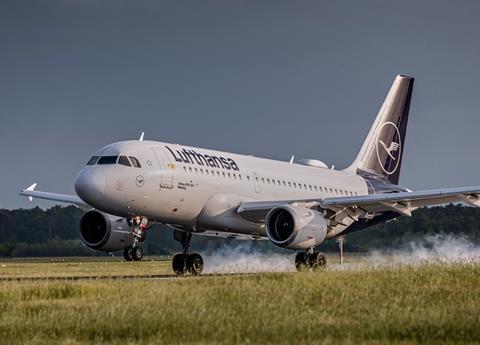German carrier Lufthansa and regional unit CityLine are braced for fresh strike disruption on 12 and 13 March, this time as cabin crew represented by the UFO union have called a stoppage.
The strike action, which will run from 4am to 11pm on both days, will impact operations from Lufthansa’s Frankfurt hub on 12 March and its Munich operations on 13 March. The union says it follows a ballot of members, after talks on a new collective deal covering the airline’s roughly 18,000 cabin crew, broke down earlier this year.

Lufthansa says it expects the action to cause “significant impact” to its flight schedule.
It comes after the airline has been recently hit by industrial action by ground staff represented by the Verdi union, together wider transport staff industrial action within Germany. The cabin crew action is compounded by a rail strike impacting travel to airports on 13 March.
In disclosing an operating profit of around €2.7 billion ($2.9 billion) for 2023 earlier this month, Lufthansa estimated it took a strike impact of around €100 million over the first two months of this year.
Speaking during Lufthansa Group’s full-year results call on 7 March, chief executive Carsten Spohr argued industrial action has a direct impact on growth prospects.
”So less growth, less promotions. This is what the staff understand to be the output of these strikes,” he said. ”They have learnt from previous labour conflicts that we are not just willing to give in just for a few more days of peace. As I said once at a pilot strike, rather a few days without Lufthansa than one day an aviation world without Lufthansa.
”I would see that they would rather fly and work than strike,” he says, adding: ”We are not that far apart, so there should be room for solutions.”
He also points to the impact of wider union behaviour within Germany. ”It is mainly seen on critical infrastructure, the train system, airports, public transport. So I think Lufthansa is in the middle of a significant shift of union behaviour here in Germany, which with full employment in Germany lacks an incentive for unions to reconsider their actions quickly.
”I’m still optimistic we’ll find solutions here, but there is something bigger happening, and this is making us more convinced that our strategy of becoming more international – operating hubs outside of Germany, putting maintenance work outside of Germany - will continue to be the right track for [the group].”


























